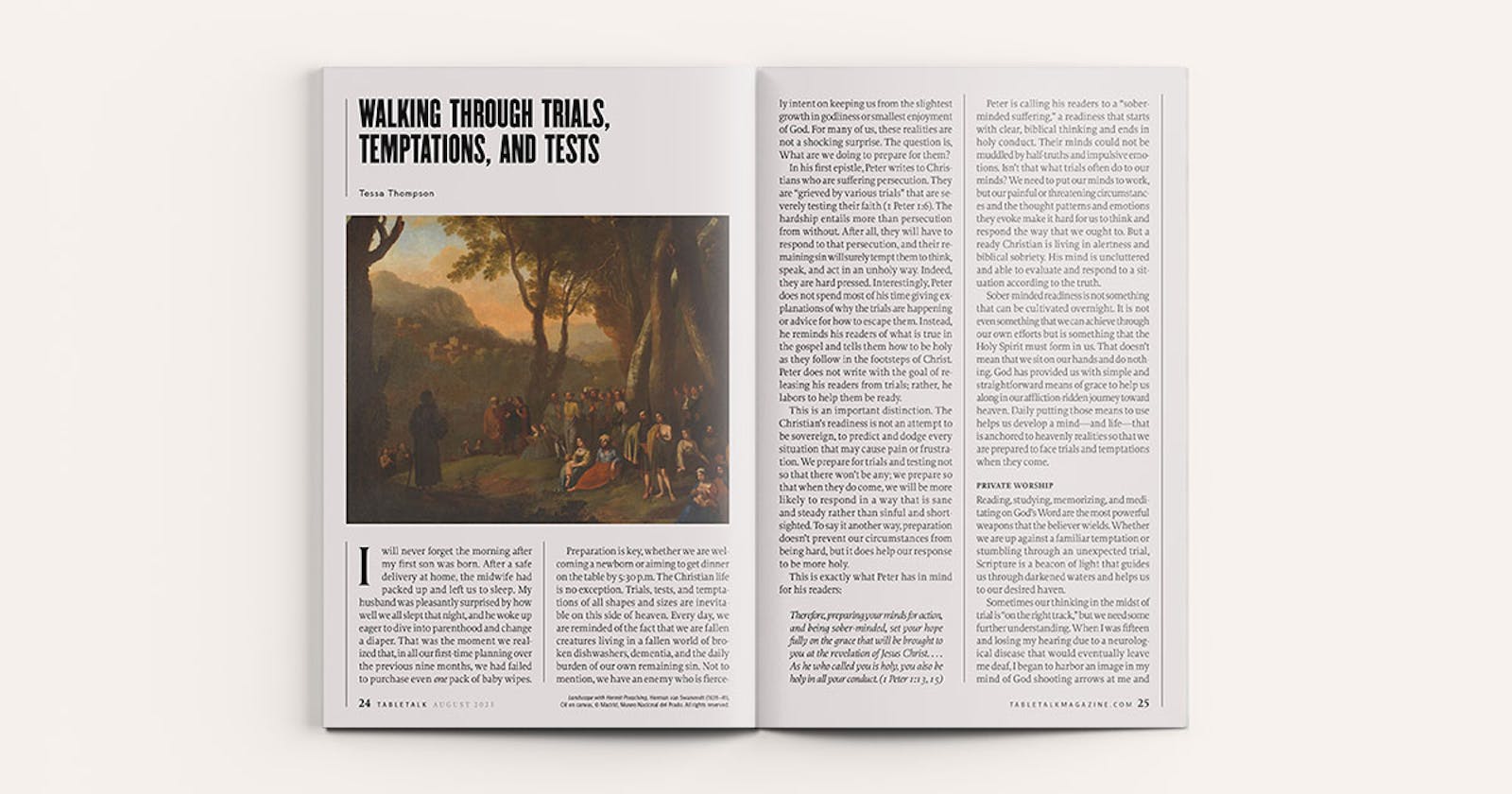
Request your free, three-month trial to Tabletalk magazine. You’ll receive the print issue monthly and gain immediate digital access to decades of archives. This trial is risk-free. No credit card required.
Try Tabletalk NowAlready receive Tabletalk magazine every month?
Verify your email address to gain unlimited access.
I will never forget the morning after my first son was born. After a safe delivery at home, the midwife had packed up and left us to sleep. My husband was pleasantly surprised by how well we all slept that night, and he woke up eager to dive into parenthood and change a diaper. That was the moment we realized that, in all our first-time planning over the previous nine months, we had failed to purchase even one pack of baby wipes.
Preparation is key, whether we are welcoming a newborn or aiming to get dinner on the table by 5:30 p.m. The Christian life is no exception. Trials, tests, and temptations of all shapes and sizes are inevitable on this side of heaven. Every day, we are reminded of the fact that we are fallen creatures living in a fallen world of broken dishwashers, dementia, and the daily burden of our own remaining sin. Not to mention, we have an enemy who is fiercely intent on keeping us from the slightest growth in godliness or smallest enjoyment of God. For many of us, these realities are not a shocking surprise. The question is, What are we doing to prepare for them?
In his first epistle, Peter writes to Christians who are suffering persecution. They are “grieved by various trials” that are severely testing their faith (1 Peter 1:6). The hardship entails more than persecution from without. After all, they will have to respond to that persecution, and their remaining sin will surely tempt them to think, speak, and act in an unholy way. Indeed, they are hard pressed. Interestingly, Peter does not spend most of his time giving explanations of why the trials are happening or advice for how to escape them. Instead, he reminds his readers of what is true in the gospel and tells them how to be holy as they follow in the footsteps of Christ. Peter does not write with the goal of releasing his readers from trials; rather, he labors to help them be ready.
This is an important distinction. The Christian’s readiness is not an attempt to be sovereign, to predict and dodge every situation that may cause pain or frustration. We prepare for trials and testing not so that there won’t be any; we prepare so that when they do come, we will be more likely to respond in a way that is sane and steady rather than sinful and shortsighted. To say it another way, preparation doesn’t prevent our circumstances from being hard, but it does help our response to be more holy.
This is exactly what Peter has in mind for his readers:
Therefore, preparing your minds for action, and being sober-minded, set your hope fully on the grace that will be brought to you at the revelation of Jesus Christ. . . . As he who called you is holy, you also be holy in all your conduct. (1 Peter 1:13, 15)
Peter is calling his readers to a “sober-minded suffering,” a readiness that starts with clear, biblical thinking and ends in holy conduct. Their minds could not be muddled by half-truths and impulsive emotions. Isn’t that what trials often do to our minds? We need to put our minds to work, but our painful or threatening circumstances and the thought patterns and emotions they evoke make it hard for us to think and respond the way that we ought to. But a ready Christian is living in alertness and biblical sobriety. His mind is uncluttered and able to evaluate and respond to a situation according to the truth.
Sober-minded readiness is not something that can be cultivated overnight. It is not even something that we can achieve through our own efforts but is something that the Holy Spirit must form in us. That doesn’t mean that we sit on our hands and do nothing. God has provided us with simple and straightforward means of grace to help us along in our affliction-ridden journey toward heaven. Daily putting those means to use helps us develop a mind—and life—that is anchored to heavenly realities so that we are prepared to face trials and temptations when they come.
private worship
Reading, studying, memorizing, and meditating on God’s Word are the most powerful weapons that the believer wields. Whether we are up against a familiar temptation or stumbling through an unexpected trial, Scripture is a beacon of light that guides us through darkened waters and helps us to our desired haven.
Sometimes our thinking in the midst of trial is “on the right track,” but we need some further understanding. When I was fifteen and losing my hearing due to a neurological disease that would eventually leave me deaf, I began to harbor an image in my mind of God shooting arrows at me and thought of Him as a taker, removing one by one the things I loved most. This made for a rather emotionally charged relationship with God for some time. In a sense, my understanding was correct. God’s hand was in the painful circumstance. He did take things away. But a mere knowledge of God’s sovereignty was not going to cut it. If I was going to come out of this trial intact, I needed to ask: What else is true? What is His heart toward me? How does Satan fit into this? Should I expect God to sovereignly heal me?
God is sovereign, sin remains, and suffering ought to be expected on this side of heaven. True—but there’s more. Immersing ourselves in God’s Word (and in sound books that explain it) expands and, when necessary, corrects our understanding.
One of the clearest examples of a “ready mind” in Scripture is Jesus’ being tempted in the wilderness. When Satan tried to twist God’s Word, Jesus needed to know in those moments what else was true. And He did. God’s Word was stored up in His heart, and a right understanding of it was an effective weapon in time of temptation. Paul says in 1 Corinthians 10:13 that in times of temptation, God “will also provide the way of escape, that you may be able to endure it.” We often picture this “way of escape” as some external force grabbing us by the shoulders and removing us from the temptation. More often than not, God’s intended escape is not an extraordinary rescue but a ready recollection of Scripture, which the Holy Spirit powerfully uses to help us stand.
As our minds are trained and harnessed by biblical truth, it affects the way we pray. The freedom to approach God’s throne and pour out our hearts to Him is a great comfort when we are enveloped in the fires of life. If we are not careful, however, our emotionally packed prayers can end up causing us to stumble when they ought to be helping us stand steady. We are often drawn to the prayers of David in the Psalms and the raw honesty he expressed toward God at his lowest lows. He was no stoic with a fake smile plastered on his face. But David’s prayers were more than honest declarations of how he felt or what he desired; they were sober-minded, honest declarations of truth, primarily about God’s character and ways. Truth—not feeling—got the last word. When a mind steeped in Scripture increasingly shapes our fervent prayers, communion with God becomes a safe place of praise, confidence, and comfort rather than a stumbling block of unbiblical expectations and rashly spoken words.
public worship
I don’t always desire to be at church on Sundays. Being deaf means that the sermon will be read as captions on my phone, the singing will be silent, and the fellowship will be tiring at best and awkward at worst. Nevertheless, God chose for me to be a pastor’s wife, so I usually show up. As I have navigated the trial of this neurological disease over the last two decades, one of the biggest temptations has been to isolate myself from the body of Christ. They don’t understand. It’s too awkward. I can’t even participate. This may be more comfortable, but it has never been more fruitful. God has given us the gift of corporate worship with the body of Christ as a valuable means of encouragement, growth, and steadiness to spur us on toward heaven.

When we make it a priority to join and regularly attend a biblically faithful church, we have a weekly opportunity to build up our sober-minded readiness as we take in the various elements of the service, especially the preaching. Devoting ourselves to Lord’s Day worship also serves as a humbling reminder—as painful as it is—that God, not me, is at the center of all things. There is something bigger going on than my own struggle, and I need that truth to reorient my thinking.
It’s one thing to slip into the pew and stick around until the benediction, but it’s another thing to head to the coffee room and seek people out for fellowship. Fellowship is complicated because it involves people, and people are complicated because they are sinners. We miscommunicate, get busy and forget about needs, and ramble on about the weather right after hearing a sermon on the Trinity. Yet our wonder-working God uses even this messy part of corporate worship to strengthen our souls and straighten our thinking when staying home would have left us in a place of discouragement and despair. We would do well to pray on Sunday mornings: “Lord, help me to listen patiently and speak carefully. Use the interactions I have today to make me and others more holy in the coming week.”
toward our perseverance
The Christian life is a narrow path of suffering and sanctification, and cultivating sober-minded readiness keeps us from straying off the path when it gets especially difficult. Those apart from Christ wonder why we make any effort to stay on the path at all. Perhaps at times we are wondering the same thing. The reality is that sometimes the path stays hard and there is no end of the suffering in sight. The pain is chronic, the relationship remains strained, and the overcoming of that one sin is agonizingly slow. Why press on?
Perhaps Peter’s readers were asking the same question, and he does not fail to answer—a sober-minded suffering is a suffering endured with a sober-minded hope of what is to come. In fact, this is the pattern we see throughout the New Testament Epistles. In all their concerns about the present, the writers were ultimately aiming at Christ’s return, creation’s renewal, and the believer’s glorification. Every command, every encouragement from the gospel, every rebuke and affirmation, every explanation of God’s character and ways—in all these things, the end goal is not a happy Christian life on earth but a coming, eternal life with Christ in heaven. This is the Christian’s happy prospect—the gospel that we believe now by faith will in that day become sight. We will see the Father’s open arms, and we will bow before the nail-scarred hands of Christ. The holiness that we pursue now will be perfected, and as we fix our gaze on the perfect holiness of Christ, “we shall be like him, because we shall see him as he is” (1 John 3:2).
